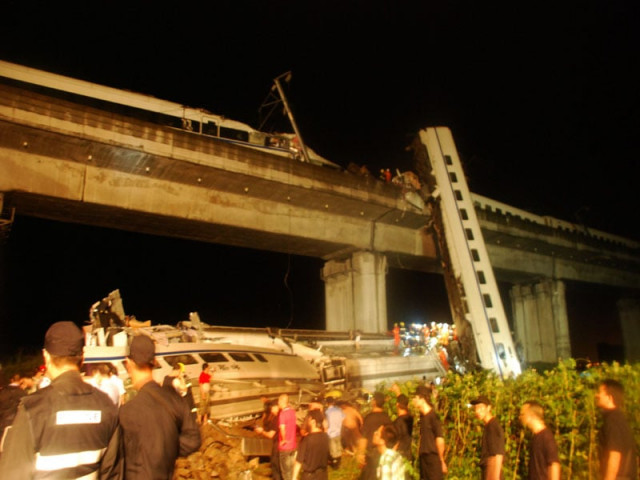11 people killed as two bullet-trains derail in China
One train had stopped after being struck by lightning when a second train rammed into it from behind.

The derailed train had been crippled by a lightning strike and was stopped when the second one ploughed into it, the reports said, in an accident likely to raise new questions about the safety of a rapid rail expansion.
The D3115 high-speed train, from Hangzhou to Wenzhou in eastern China's Zhejiang province, was rammed from behind by the D301 express in its destination city, China National Radio said.
The first train derailed and two of its carriages fell from an elevated track at around 8:30pm (1230 GMT), the official Xinhua news agency reported, citing local firefighting sources. At least 89 people were injured, it said.
Photos posted on Chinese websites and microblogs showed a long rail carriage standing vertically, with one end leaning on the viaduct and the other resting on the ground at least 10 metres (33 feet) below.
A second carriage also was lying fully on the ground below the track, having apparently fallen completely off, with rescue personnel swarming over it.
They also showed mangled metal sections of one carriage and people being carried away from the scene, although it was not clear whether those victims were injured or dead.
Xinhua said the capacity of each car on the train was about 100 passengers.
China National Radio quoted an unnamed Shanghai Railway Bureau official who had gone to the scene as saying the D3115 was halted by a lightning strike.
The accident occurred less than a month after China inaugurated with great fanfare a new flagship $33 billion line from Beijing to Shanghai that halves the rail journey time between the two Chinese cities to five hours.
It was opened on the eve of July 1 celebrations to mark the 90th birthday of China's Communist Party and authorities touted it as yet another symbol of the country's growing advancement.
However, the new Beijing-Shanghai line has suffered problems with delays caused by power outages, sparking a slew of criticism online and in Chinese media.
China has poured money into a massive rail expansion but the huge investments have spurred allegations of corruption, and raised concerns over costs and whether corners were being cut on rail safety.
China's state auditor has said construction companies and individuals last year siphoned off 187 million yuan ($29 million) from the Beijing-Shanghai project.
The revelation followed the February sacking of former railways minister Liu Zhijun, who allegedly took more than 800 million yuan in kickbacks over several years on contracts linked to China's high-speed network.
The official China Daily said Monday the power supply incident on the Beijing-Shanghai line had raised fresh concerns over the safety of the landmark link, which opened a year ahead of schedule.
Similar trains are used on the line where the accident occurred, which was operating before the new Beijing-Shanghai link.
In April 2008, 72 people were killed and more than 400 injured when one train derailed and another collided with it in the eastern province of Shandong.
The accident raised transport safety concerns for the Beijing Olympics just months later.



















COMMENTS
Comments are moderated and generally will be posted if they are on-topic and not abusive.
For more information, please see our Comments FAQ